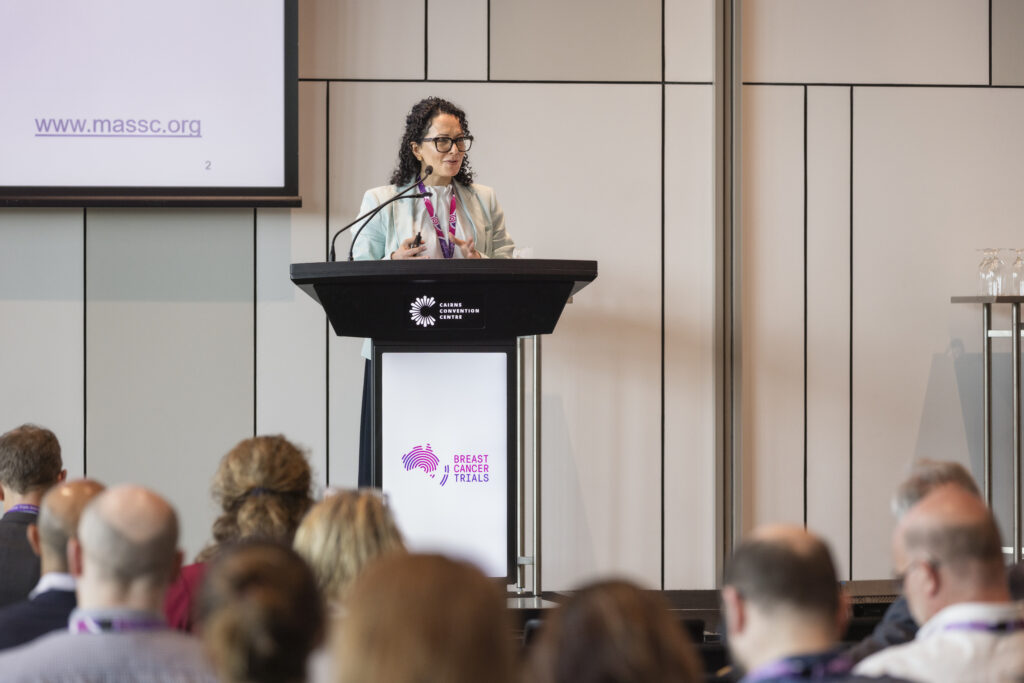About Professor Marina Reeves
Marina Reeves is a Professor in the School of Public Health and Deputy Associate Dean of Research in the Faculty of Medicine at the University of Queensland. She is also an advanced accredited practicing dietician coordinating a research program that is focused on breast cancer epidemiology and the role of supportive care interventions in improving outcomes and quality of life for women diagnosed with breast cancer.
We spoke with Professor Reeves about the importance of optimizing care for metastatic breast cancer patients through diet and exercise.
Research focus: how exercise and diet can improve quality of life for breast cancer patients
“So metastatic breast cancer is when the cancer spreads outside of the local breast area, usually to distant parts of the body. For women with breast cancer, it’s often to the bones, or it could be the lungs, brain, liver, or other sites.”
“And so those women live with an incurable, but treatable, disease. And treatments have evolved over the last few years. So, it’s great that we’ve got some newer treatments. And those women are living for longer than they did in the past, which is wonderful. But they’re living for longer still with battling side effects and impacts on their quality of life.”
“And so, our research is really focused on how exercise and diet can help to improve their quality of life. Potentially they’re survival, but really focused on improving that quality of life.”
Listen to the Podcast
We spoke with Professor Reeves about the importance of optimizing care for metastatic breast cancer patients through diet and exercise.
Exercise benefits women with metastatic breast cancer both physically and emotionally
“We’ve got really good evidence on how exercise benefits women with early-stage breast cancer. Both evidence that shows that it’s likely associated with survival, but also helps to manage a range of side effects, so fatigue, but also helps to improve their mental wellbeing, as exercise does for everyone in the population.”
“In the metastatic setting, this evidence is just starting to slowly grow and so we’ve got some really good evidence now, through a new trial that’s just come out, on the benefits of exercise specifically for women around fatigue, quality of life, reducing pain, and improving sexual function.”
“So, lots of benefits that we can start to see in this population of women with metastatic breast cancer, which is great.”
What types of exercises are recommended for women with metastatic breast cancer?
“So, it’s really important that you start slowly, but often. So even if you’re not doing any exercise at the start, any exercise is going to be beneficial, but ultimately what we want women to be able to get to, similar to the general population, is increasing what we’d call vigorous physical activity or that aerobic cardiovascular physical activity, which could just be walking, but also trying to get them to increase their resistance exercise, so strength based exercise, because it’s really important.”
“And our particular interest is on maintaining that muscle mass and preventing what we know with age, but also with cancer and with treatments will decline.”
Diet and breast cancer
What role does diet play in managing metastatic breast cancer?
“So, women are bombarded with information, if a woman was diagnosed with either early-stage breast cancer or metastatic breast cancer and went to ‘doctor Google’, they will find a wealth of information, but not necessarily evidence based information. And so, we know this population is particularly prone to misinformation around diet.”
1. Maintain adequate protein intake
“And so, we know that dietary intake in addition to resistance exercise is really important in maintaining that muscle mass. And so, our primary recommendation to women is around maintaining adequate protein intake. We also know that some women, depending on the treatments that they’ve had, can get taste alterations. So, the taste of meat, or certain foods may not be the same as they were.”
“So, we really work on how to make sure that you’re still getting adequate protein intake within the foods that you’re eating.”
2. Prioritise muscle mass
“There’s no clear evidence at all on any single diet, any single food or anything that’s necessarily going to change the progress of metastatic breast cancer and improve or negatively impact survival. Where our interest lies, given the really limited evidence we have, is knowing the role and how important muscle mass is.”
Support and resources for women with metastatic breast cancer
“This is an area that we’re particularly passionate about advocating for, because currently women with metastatic diagnosis, not just around diet and exercise, but generally tend to get a lot less support than what a woman with an early-stage diagnosis receives. And so, there’s a strong movement and need for there to be equitable access to that support.”
1. Need to improve access to resources and information through hospitals
“Currently, Breast Cancer Network Australia has resources and information available. Some hospitals may provide some tailored support for metastatic breast cancer, but very few of them offer exercise programs for that group of women. They’ll offer exercise programs for early stage, but very few will offer exercise programs specifically for metastatic women.”
2. Advocate for greater support for women with metastatic breast cancer
“And so, we’re trying to advocate and create the evidence to change that practice. We do know that women have access, if they go and see their GP, to get onto a chronic disease management plan. And that gives them Medicare reimbursed sessions to see an exercise physiologist or a dietician, but it’s limited in terms of the number of sessions that they can receive with that.”
“So, our goal is to try and change the way and the supports that are available to these women in the future.”
“So, my hopes for women with breast cancer, and my reason for focusing on this research is my mum who had metastatic breast cancer, and I saw the terrible time that she went through and the impacts of the treatment and the cancer on her quality of life.”
Professor Marina Reeves’ hope for the future
“And so, my goal is that no women have to suffer like my mum. Ideally, no women ever die from breast cancer again. And that would be the ideal, that no one ever gets breast cancer. But my goal is that we can create the supportive care intervention so that women can live and thrive with a metastatic breast cancer diagnosis.”
Breast cancer diet FAQs
What foods to eat?
Explore various foods that may help in reducing the risk of breast cancer or aid in managing it, including leafy green vegetables, cruciferous vegetables, allium vegetables, citrus fruits, berries, fatty fish, fermented foods, beans, herbs, spices, whole grains, and walnuts.
What foods to avoid
Explore the foods and beverages that individuals with breast cancer may consider limiting or avoiding, such as those containing soy, to potentially reduce risk or manage the condition.
Do you have a breast cancer diet guide for clinicians?
While we don’t have a specific diet guide, there are some key dietary considerations for breast cancer patients based on current research. Here are some general recommendations that clinicians and patients may find useful:
- Focus on wholefoods: emphasise fruits, vegetables, wholegrains and legumes whiles aiming for a variety of colours and types to ensure a range of nutrients.
- Healthy fats: encourage sources of healthy fats like olive oil, avocado, nuts, and fatty fish (like salmon), while limiting saturated and trans fats.
- Lean proteins: suggest lean protein sources such as poulty, fish, beans, and plant-based proteins.
- Limit processed foots: encourage reducing the intake of processed and sugary foods, as well as red and processed meats.
- Keep up hydration: remind patients to stay well-hydreated, primarily with water.
- Maintain a healthy weight: discuss the importance of maintaining a healthy weight, as obesity can be a risk factor for recurrence.
- Limit alcohol consumption: suggest limiting alcohol intake, as it has been linked to an increased risk of breast cancer.
Is there any evidence that keto diet helps metastatic breast cancer?
The ketogenic (keto) diet, which is high in fats and low in carbohydrates, has gained attention in cancer research, including metastatic breast cancer.
While there is some preliminary interest in the keto diet’s potential benefits for breast cancer patients, more comprehensive research is necessary to determine its effectiveness and safety. It’s essential to approach dietary changes cautiously and with professional guidance.
Both the plant-based diet and the Mediterranean diet have been associated with potential benefits for cancer prevention and overall health:
- A Plant-Based Diet: A plant-based diet focuses on consuming a variety of fruits, vegetables, whole grains, legumes, nuts, and seeds, providing a wealth of vitamins, minerals, and antioxidants. Research suggests that this diet may lower the risk of certain cancers, including breast cancer, by reducing inflammation, improving hormone levels, and promoting a healthy weight. High fiber intake from plant-based foods is linked to improved gut health and may further help lower cancer risk. Overall, a plant-based diet is often associated with lower body weight and reduced obesity risk, both of which are important factors in cancer prevention.
- The Mediterranean Diet: The Mediterranean diet emphasises the consumption of fruits, vegetables, whole grains, fish, olive oil, and moderate wine intake, promoting heart health and well-being. Its anti-inflammatory properties may help reduce cancer risk by modulating inflammation and oxidative stress. Clinical studies indicate that adherence to a Mediterranean diet may be associated with lower breast cancer risk and improved survival rates among diagnosed individuals. This diet provides a balanced intake of healthy fats, lean proteins, and complex carbohydrates, supporting overall health.
Both diets are rich in nutrients and have been linked to various health benefits, including potential protective effects against breast cancer. They emphasise whole foods and healthy fats, which can be important for overall health and well-being.
Encouraging patients to adopt a balanced, nutrient-dense diet can be beneficial. As always, it’s essential for individuals to consult with their healthcare team before making significant dietary changes.
Support Us
Help us to change lives through breast cancer clinical trials research.
Support Us
Help us to change lives through breast cancer clinical trials research



